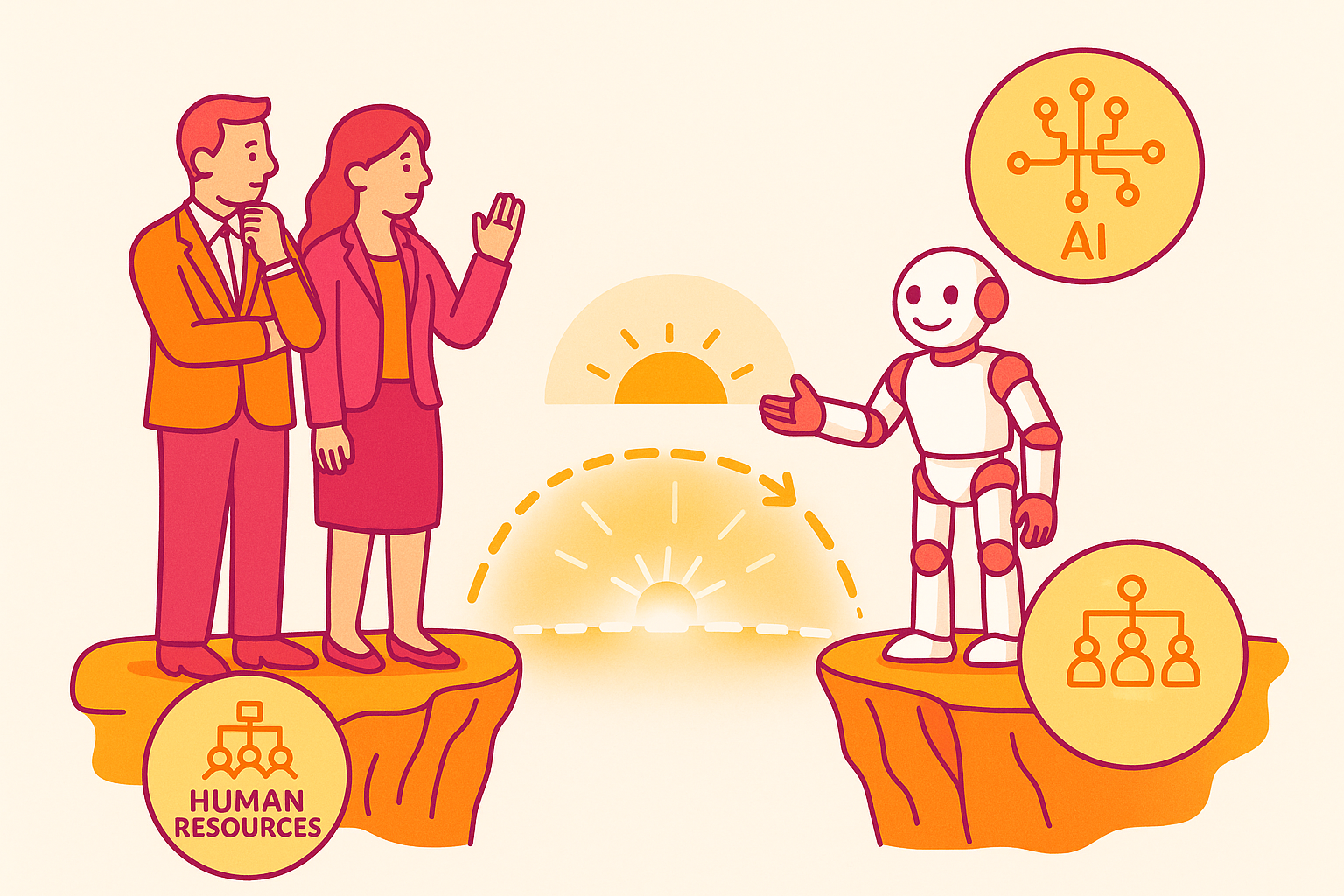
Artificial intelligence is hotter than ever – but is HR keeping up?
From conferences to boardrooms, HR professionals are bombarded with messages about how AI will reshape their field. Since tools like ChatGPT made headlines in late 2022, the buzz has only grown. But behind the hype, what’s really happening in HR departments?
The new Vlerick-Hudson HR Barometer 2025 reveals a striking gap between AI ambitions and action. While AI is high on the HR agenda, its use in daily practice is still limited. In many organisations, it remains a promising idea rather than a concrete reality.
This opinion piece explores that disconnect —and why now is the time for HR leaders to bridge the gap between potential and progress.
The Paradox: AI is on the radar, but not a top priority
The latest Vlerick-Hudson study highlights a striking paradox. AI was the spotlight theme of the HR Barometer 2025 - yet it ranks lowest on the list of HR priorities.
In fact, AI in HR ranks bottom of the priority list for 2025. While AI dominates discussions, it’s also the area where HR professionals feel least confident.
So why is AI so low on the agenda, despite all the attention?
Most Belgian HR leaders agree that the focus on AI is justified. What's more, 78% see its potential in their role as HR leaders and 86% say they intend to use it more in the future. There’s no lack of interest or belief in AI’s relevance—none of the surveyed HR directors reported actively steering away from it.
And yet, this positive outlook has (so far) not translated into urgency or deep expertise. Why? Rather than rushing in, many HR teams are deliberately taking it slow. They’re exploring, experimenting, and observing. Cautious steps instead of bold leaps. The enthusiasm is there, but the urgency and expertise are still catching up.

Don't miss your chance to get a seat at the table
Beyond the AI-Mirage: The future of work & talent with prof. Frederik Anseel
This roundtable with Professor Frederik Anseel is usually invite-only. Exceptionally, we are offering the opportunity to three lucky professionals to attend as well. Just click through to the landing page, register, and you might be one of the winners.
AI is already making a difference in HR
AI might not be a top priority just yet, but it’s already making a tangible impact in HR. The most common use cases are in recruitment and HR administration. According to the HR Barometer report, 70% of organisations currently use AI in recruitment and selection, followed by 60% in HR operations and admin. Think CV screening, automating repetitive tasks or using smart chatbots to handle employee questions.
It’s no surprise that language model technology—such as GPT-based systems—is the most widely used form of AI in HR. The study shows that Large Language Models (like ChatGPT) are by far the most dominant AI application in HR (69%). That's well ahead of traditional chatbots (25%) and RPA bots for process automation (18%). Many HR teams are experimenting with freely available tools like the public version of ChatGPT, especially in the recruitment process. These low-barrier tools are often used for specific tasks (e.g. drafting job descriptions), while more advanced or paid solutions tend to support a wider range of HR functions.
That said, some areas of HR remain relatively untouched by AI. In talent management—such as performance reviews or career planning—only 17% report using AI. The potential is there, but still largely untapped. These findings show that while AI is already delivering value in specific areas, a broader transformation is still on the horizon.
Cautious optimism among Belgian HR leaders
Belgian HR leaders approach AI with cautious optimism. On the one hand, there’s clear enthusiasm: HR directors recognise AI’s potential, want to engage with it, and none explicitly reject its use. On the other, there’s pragmatism: a desire to move forward thoughtfully and responsibly. For example, 58% believe AI adoption in HR is lagging behind other departments like IT, customer service or marketing. There’s awareness of the delay, but little appetite for rash decisions.
According to the HR Barometer, nearly half (45%) of HR leaders are opting for a gradual introduction of AI. The current AI landscape in HR is marked by experimentation (36%), exploratory initiatives (27%) and individual pilot projects (13%). In other words, many organisations are still in a trial-and-error phase: a pilot here, a tool test there or an initiative driven by an enthusiastic team member. A structured, organisation-wide AI policy remains rare.
Yet, the overall tone is positive. HR leaders tend to see AI as an opportunity rather than a threat. Strikingly, only 16% believe AI will soon outperform humans and just 20% expect it to lead to job losses in their organisation. Fear of AI is not widespread—an important point. The prevailing mindset is: “AI holds promise, but let’s move forward wisely and with a human touch.” This cautious optimism creates the space to take thoughtful steps forward without being paralysed by fear.
What’s holding AI back? Barriers and challenges
If the benefits are recognised and interest is high, what’s holding HR departments back from wider adoption of AI? The study identifies several stubborn barriers. The most pressing issue is people and knowledge: there is a lack of AI expertise within HR. Many HR teams currently lack the technical skills or understanding needed to initiate or manage AI projects effectively. This creates uncertainty: where to begin, which use cases to pursue, and how to avoid pitfalls?
In addition, resource and data challenges play a role. Many HR departments face limited budgets—both financial and in terms of IT support—to launch AI initiatives. Implementing AI requires investments in tools, training, and sometimes external expertise, which not every organisation can readily afford. Data quality is another stumbling block. AI learns from data, but HR data (e.g. on performance, skills, or engagement) is often fragmented, incomplete, or biased. Without clean, structured data, AI in HR quickly becomes a promising idea without a solid foundation.
Another concern is ROI measurement. While nearly half of HR leaders (48%) are satisfied with the outcomes of early AI applications, only 18% actually measure the return on investment. This lack of ROI tracking makes it harder to demonstrate success or justify further investments. Without hard numbers to show what AI delivers—in cost savings or value creation—it risks remaining a “nice-to-have” rather than a “must-have” in the eyes of top management. HR will need to get better at quantifying the impact of AI to gain internal buy-in.
Lastly, there's the issue of infrastructure and governance. Many HR teams are experimenting in isolation, without a structured approach or clear framework. There are few company-wide policies or guidelines on the use of AI in HR. Who oversees ethics, privacy, and system integration? Without this kind of framework, AI remains a loose collection of experiments rather than a strategic initiative backed by the whole organisation.
The way forward: HR as a catalyst for Human-Centred AI
The AI train is leaving the station—including in HR—and now is the time to get on board. Delaying means falling behind. Those who experiment and learn today will have the advantage tomorrow.
Yet the HR Barometer 2025 shows that many HR teams are still stuck in fragmented experiments without strategic alignment. AI is getting attention, but not yet real priority. To break this impasse, HR must reinvent itself—not as a passive user of AI, but as a proactive catalyst for its application.
The key to this lies with the CHRO. CHROs are the guardians of leadership development, organisational culture, and learning. They are uniquely positioned to embed AI literacy as a strategic growth domain—not just a technical training effort. By creating shared learning experiences, developing a common language around AI, and fostering leadership that combines curiosity and humanity with tech insight, they can lay the groundwork for successful AI adoption.
Professor Frederik Anseel makes a similar case in his blog for De Tijd: businesses must act today, even if the future is still uncertain. His message is clear:
“The future of AI is not about technology—it’s about people.”
HR has a vital role to play in bringing AI closer to people. That means unlocking access, encouraging bottom-up innovation, and giving employees the tools to improve their work with AI. Not through sweeping top-down initiatives, but through smart, practical steps: test, learn, adjust, repeat.
The message is clear: hype isn’t enough. HR must act—connecting strategy with experimentation, investing in skills, embedding ethics, and guiding both employees and leaders in this new era.
Those who start learning now will be the ones leading tomorrow. The future won’t wait. HR has a unique opportunity to be a guide in an AI-driven world: human-centred, responsible, and confident.





.png?width=66&name=HR%20in%20AI%20(1).png)



